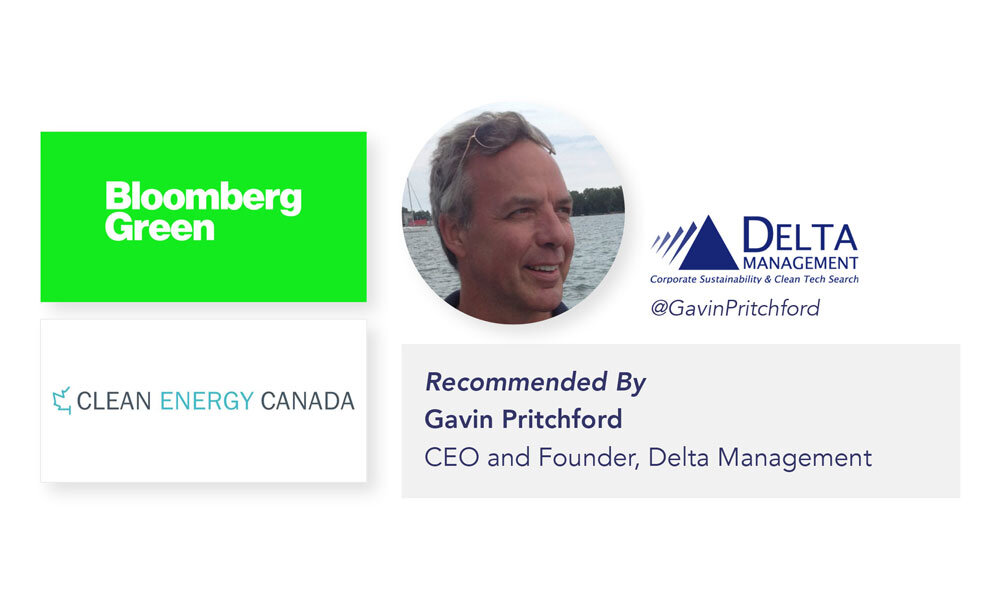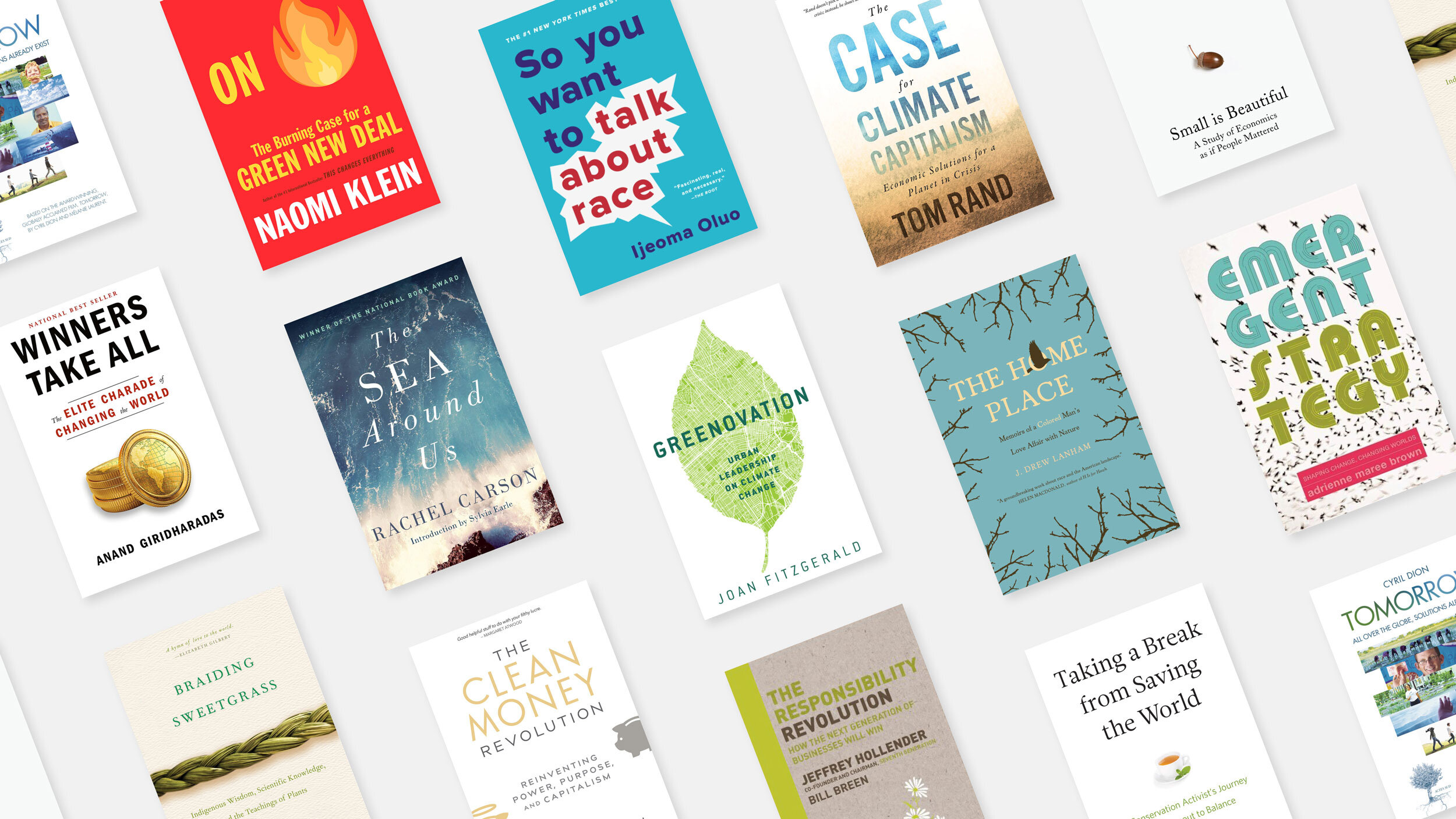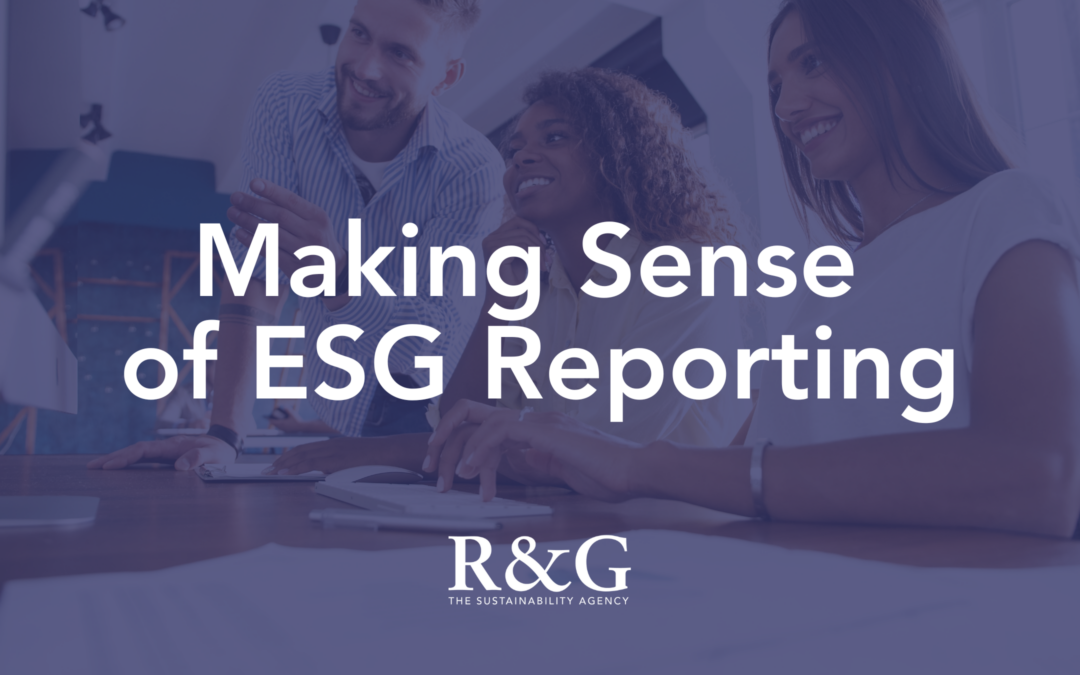With the call for a greener planet and cleaner economy growing louder, environmental advocates have a problem: how do you find the best ideas and information in the growing conversation around sustainability?
We asked business leaders, activists and creators to offer their review of a book on the subject of sustainability that they would recommend to others. The surprising result: a diverse selection of readings that offers time-tested principles and modern perspectives on the global climate crisis.
With subjects ranging from individual impact to government policy to social justice, there’s something for all readers in our round up of the 14 best books on sustainability.
1) Braiding Sweetgrass: Indigenous Wisdom, Scientific Knowledge and the Teaching of Plants by Robin Wall Kimmerer
“I just started Braiding Sweetgrass, but I already know I’ll be buying multiple copies to give as gifts. The writing is a gift in itself, as Kimmerer marries her training in western scientific traditions with Indigenous knowledge, and generously shares these perspectives to teach non-Indigenous readers like me. It’s wonderful and hopeful.” – Megan Leslie, CEO, WWF-Canada, @MeganALeslie
“This is a beautiful treatise on the wisdom of plants and what they can teach us. The author is an Indigenous woman, professor and trained botanist. She offers a way to practise Two-Eyed Seeing and decolonize our thinking. It is a book that makes you feel both cared for and changed.” – Ecology Action Centre, @EcologyAction
Award-winning author, professor and scientist Robin Wall Kimmerer takes a multi-lens approach to educating and enlightening readers on our relationship to the natural world. A member of the Citizen Potawatomi Nation, Kimmerer’s perspective, insight and prose have made Braiding Sweetgrass, and her previous book, Gathering Moss, vital records of environmental and Indigenous knowledge.
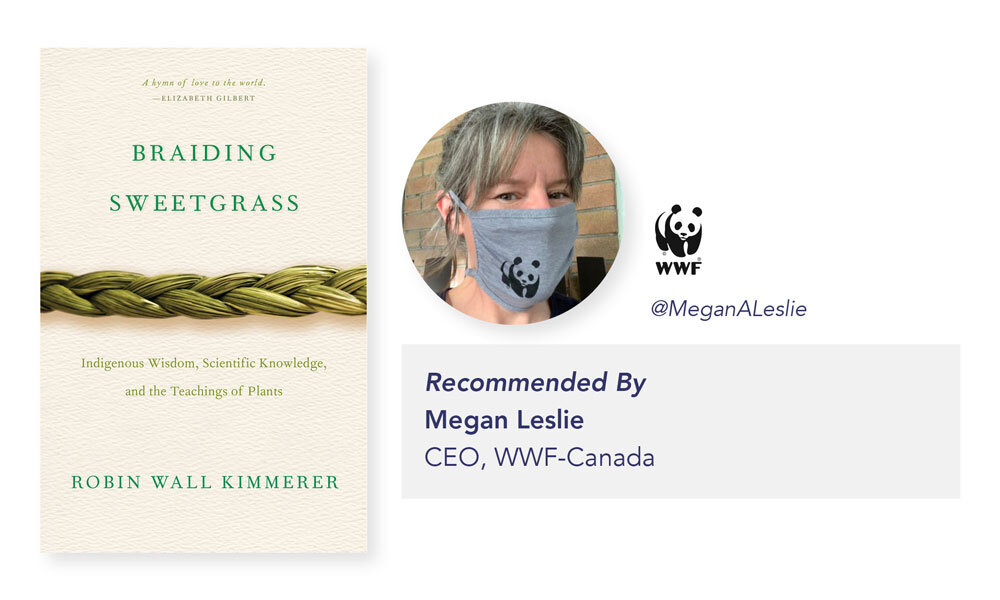
2) On Fire: The Burning Case for a Green New Deal by Naomi Klein
“I’m biased of course, but my recommendation would be for Naomi Klein’s On Fire: The Burning Case for a Green New Deal. It is a fabulous collection of essays from the last few years. As always, Naomi connects the dots in truly original ways, highlighting the links between the climate crisis and inequality in its many dimensions. Bill McKibben describes Naomi as “the intellectual godmother of the Green New Deal,” and in this book you will see why.” – Seth Klein, Author of A Good War: Mobilizing Canada for the Climate Emergency, @SethDKlein
The latest from This Changes Everything and The Shock Doctrine author Naomi Klein is an alarming and essential bestseller, showcasing the relationship between climate destruction and political movements the world over. For a uniquely Canadian perspective on preparing the economy for a low carbon future, be sure to also read Seth’s just-released A Good War: Mobilizing Canada for the Climate Emergency.
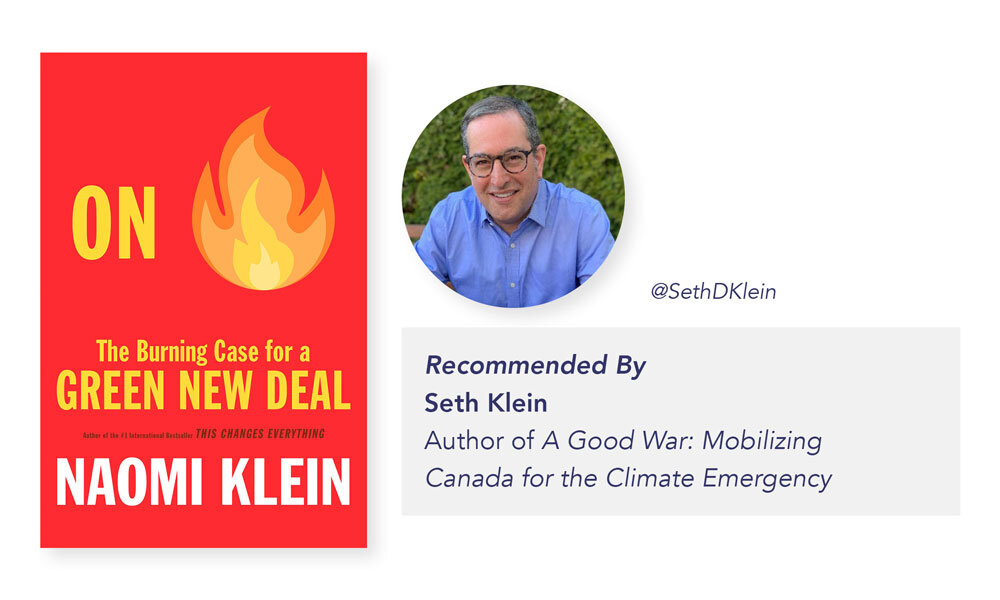
3) Emergent Strategy: Shaping Change, Changing Worlds by Adrienne Maree Brown
“Emergent Strategy was recommended to me by my co-founder, friend and sustainability leader Dominique Souris. It is an absolute must for anyone in the social movement and facilitation space. It is a non-linear book that may feel overwhelming for those of us that like structure but it really opened my eyes to the “wholeness” that a movement requires.” – Ana F. González Guerrero, Co-Founder and Managing Director, Youth Climate Lab, @anaf_gg
Detroit-based author and social justice facilitator Adrienne Maree Brown received critical acclaim for her 2017 debut. With notable influence from prescient social science fiction author Octavia E. Butler, Brown’s self-help guide invites readers to reconsider and adapt their relationship to change, both at a personal and planet-sized scale.
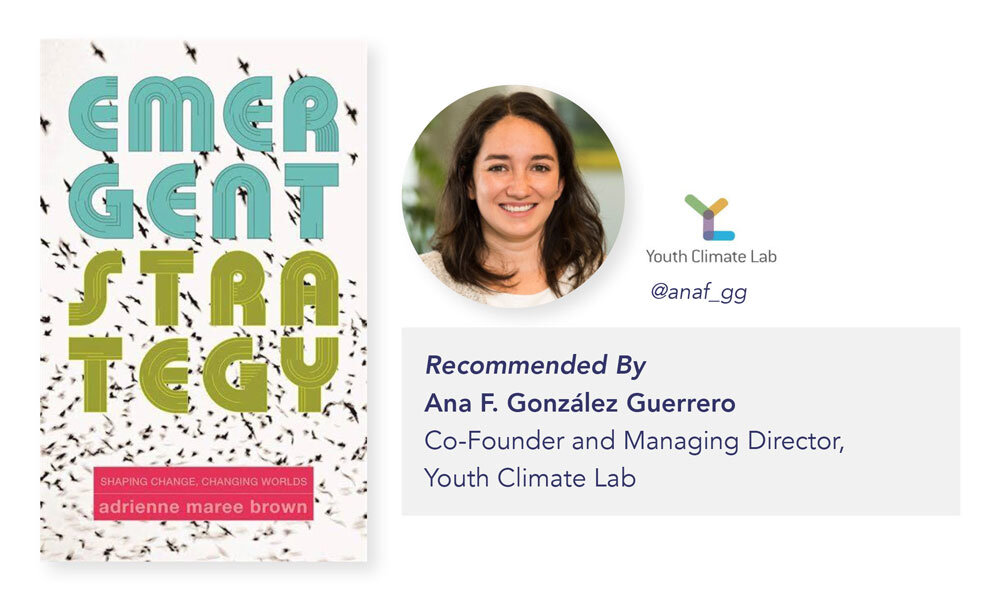
4) The Sea Around Us by Rachel Carson
“This book was written in 1951, before the idea of ocean conservation was even conceived, and stands the test of time. Carson combined science and art, provoking a sense of wonder and beauty. She revealed what we knew about the oceans and, more importantly, the vast universe that we did not. I grew up far from the coast and reading this book many years ago opened up a new world to me.” – Josh Laughren, Executive Director, Oceana Canada, @OceanaCAN
Though best known for her landmark 1962 environmental novel Silent Spring, marine biologist and author Rachel Carson won praise nearly a decade earlier with The Sea Around Us, the second entry in a trilogy of books exploring life above and below the ocean’s surface. Carson’s extensive research and poetic use of language have made her work some of the most enduring in North American conservation literature.
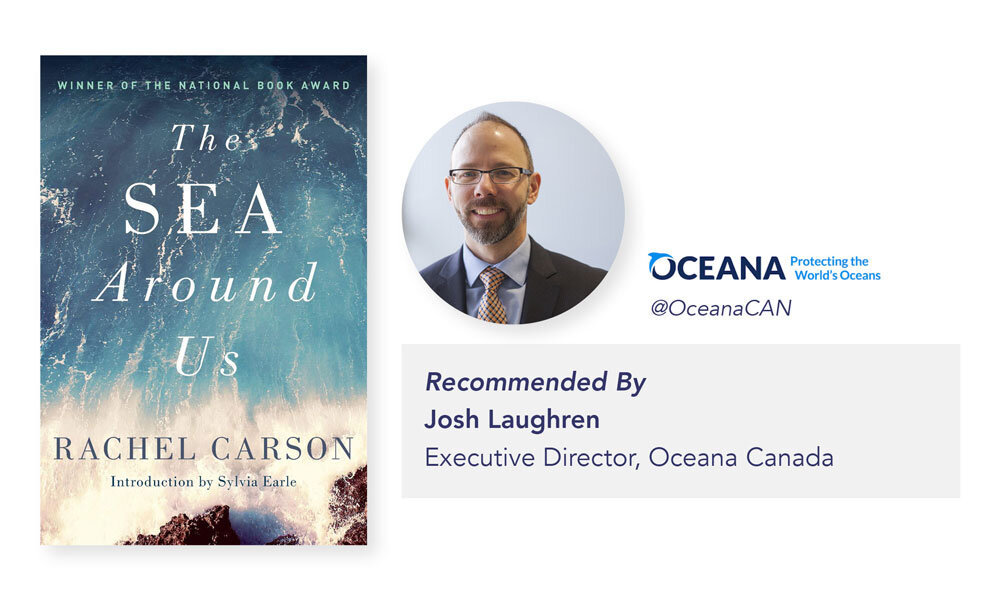
5) So You Want to Talk About Race by Ijeoma Oluo
“It’s not your typical environmental book but one that I believe is an important one for those of us in the environmental sector to read if we really want to be successful (and more understanding individuals). This book is thought-provoking and will challenge your perceptions and beliefs. For me, as a white female, it provided insight on what it’s like to be a difference race (I acknowledge that this understanding is one box that I won’t get to ever check off as complete). This is one of those books you’ll be thankful you picked up.” – Natalie Irwin, Director of Stakeholder Engagement, Efficiency Canada, @natalie_j_irwin
Ijeoma Oluo’s concise and conversational look at modern American race politics has been widely praised since its release in 2018. The New York Times bestseller provides readers an easy-to-understand (and often funny) guide to having frank conversations about race and social equity.
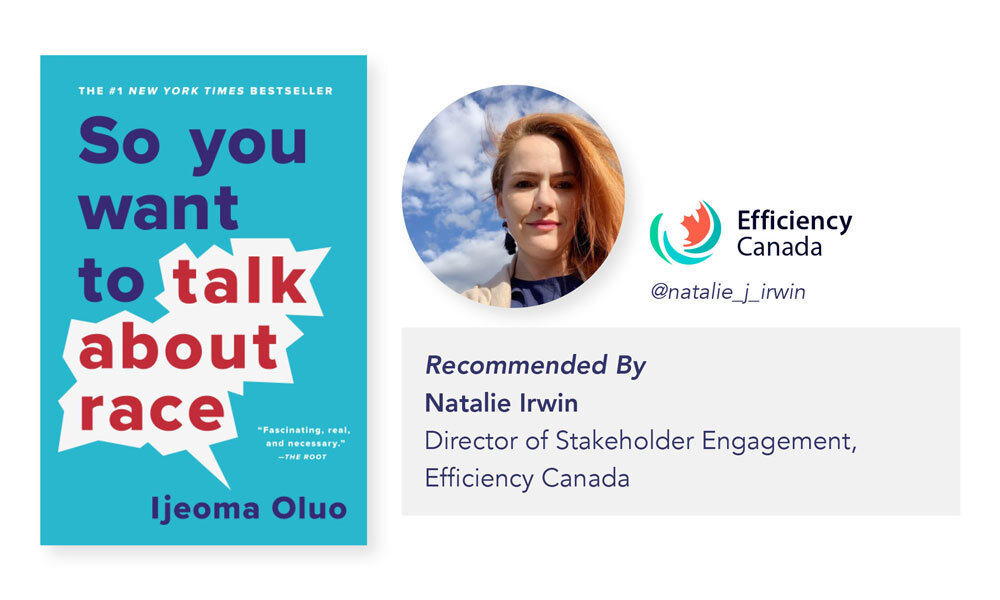
6) Responsibility Revolution: How the Next Generation of Businesses Will Win by Jeffrey Hollender and Bill Breen
“This book, when published in 2010, presented fresh ideas and actionable strategies for companies to create economic value and growth through genuine socially and environmentally responsible business. In fact, it was one of the books that inspired me to do a PhD on the business opportunity for growth and value creation through addressing environmental responsibility and societal challenges. Ten years later, it is an interesting re-read to reflect on how much, and in some cases how little, has changed in both the opportunity and the approach.” – Sarah Chapman, PhD, VP & Global Head, Sustainability, Manulife, @DrSarahChapman
Sustainability is core to the founding of many new companies today, so it can be easy to forget how, barely a decade ago, some global brands were taking major risks by adopting a more eco-conscious mindset. Seventh Generation co-founder Jeffrey Hollender explores how the likes of Nike, Timberland and Patagonia took steps to be leaders, rather than followers, in the future economy.
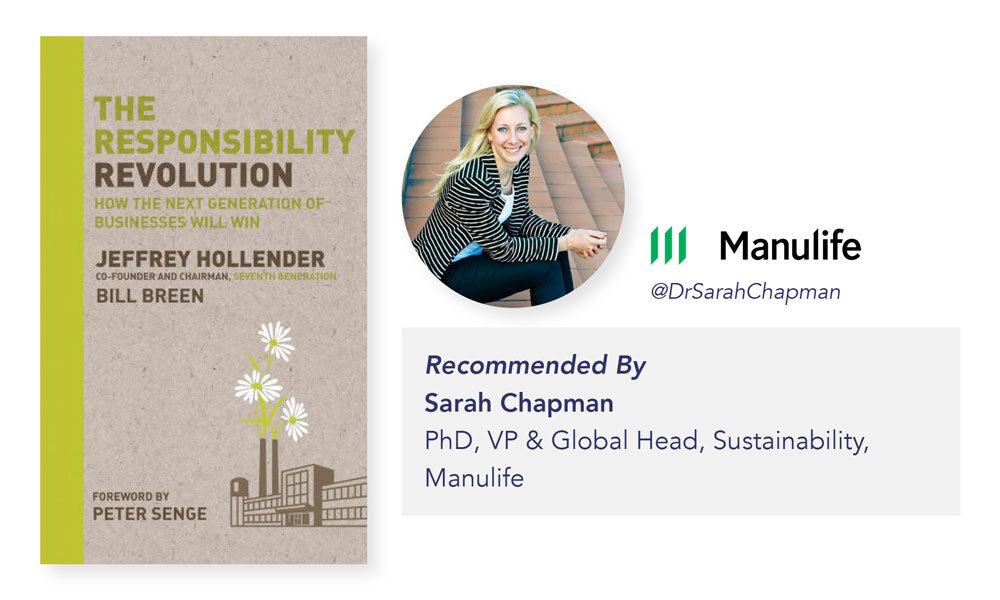
7) Greenovation: Urban Leadership on Climate Change by Joan Fitzgerald
“What I liked about the book was its focus on cities and real world examples. It also addresses the important link between climate and income inequality. In much the same way that climate change impacts lower income populations disproportionately, there is an opportunity to leverage the large-scale changes required to address climate change in a manner that addresses the ever widening income gap.” – Stephen MacDonald, CEO, Efficiency Nova Scotia, @E1steve
Addressing one of the greatest sources of greenhouse gas emissions (cities), urban policy professor Joan Fitzgerald dives deep on the thinking that separates an effective urban climate strategy from “random acts of greenness.” Published earlier this year, Greenovation will be of particular interest to those who read Fitzgerald’s previous 2010 book on the same subject, Emerald Cities: Urban Sustainability and Economic Development.
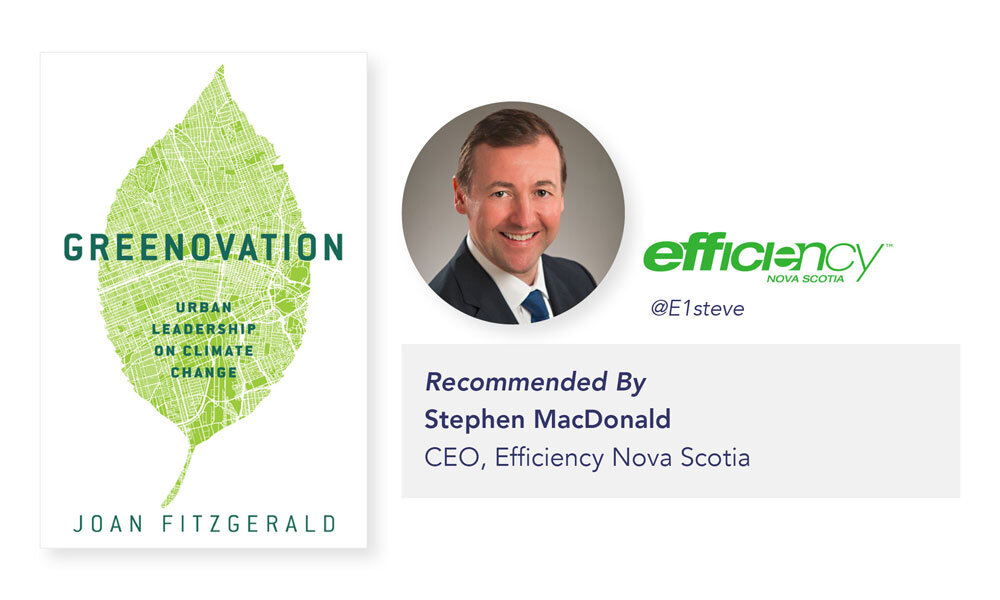
8) The Case for Climate Capitalism: Economic Solutions for a Planet in Crisis by Tom Rand
“Short of La Revolucion, sustainability as a set of values or desired outcomes operates within the confines of existing economic structures. Long-term sustainability efforts must engage those structures, bending them toward better outcomes. To that end, The Case for Climate Capitalism: Economic Solutions for a Planet in Crisis maps a pragmatic path to a low-carbon future by leveraging the most powerful tools in our economic arsenal – both public and private – to solve our most pressing problem.” – Tom Rand, Co-Founder and Managing Partner, ArcTern Ventures, @tomrand
Seeking a compromise between business-as-usual and hitting the reset button on society, author and sustainable investment advocate Tom Rand lays out a case for turning the tools behind the climate’s degradation into the source of its salvation. Released earlier this year, The Case for Climate Capitalism: Economic Solutions for a Planet in Crisis is the latest book from Rand to spotlight (and attempt to bridge) the divide between market psychology and pragmatic policy.
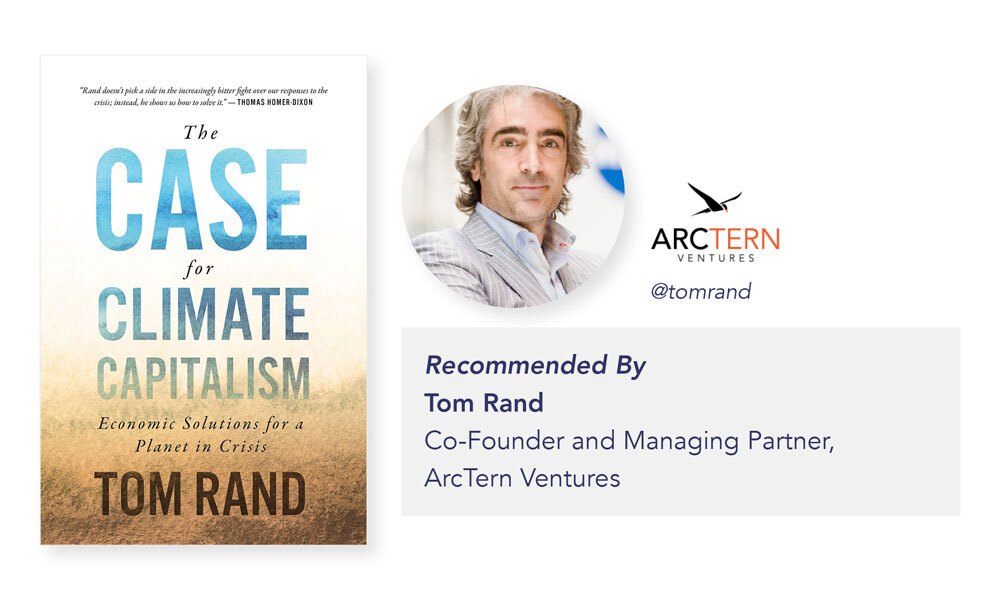
9) The Clean Money Revolution by Joel Solomon
“Joel’s book is an excellent crash course on the history of impact investing right from the early pioneers to today’s more mainstream approaches. It makes a strong case for the power of consumers and investors to turn the tide in the fight against climate change and social inequity. I would highly recommend Joel’s book for anyone wanting to see proof of clean money from both its impact perspective and the competitive returns they can generate. ” – Bernie Geiss, Founder, Cove Continuity Advisors, @BernieGeiss
Co-founder of the mission-driven venture capital firm Renewal Funds, Joel Solomon draws on decades of experience investing in growth-stage companies to forecast and reframe the reader’s vision of the future economy. Highlighting the changemakers of today who are driving the values of tomorrow, Solomon makes a compelling case for how the next generation of capital managers can navigate a world shaped by both climate change and the fight against it.
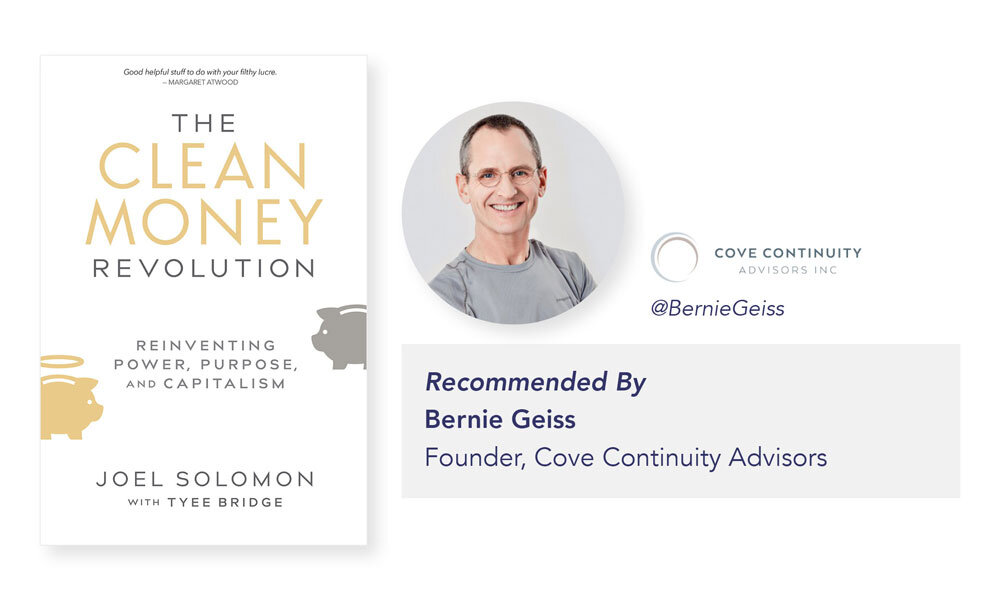
10) The Home Place: Memoirs of a Colored Man’s Love Affair with Nature by J. Drew Lanham
“This book follows the journey of a Black birder who explores race, identity, and culture while connecting to nature and the outdoors. I really love this book because it provides a rich, personal context about the struggles many Black, Indigenous, and People of Color have to face in the outdoors. It also allows you to see the power that land has to heal and understand one’s own identity and path in the world!” – Kristy Drutman, Creator and Host, Brown Girl Green, @BrownGirl_Green
Scholar and wildlife biologist J. Drew Lanham’s award-winning 2016 debut explores personal and political history to better understand his own experience growing up a Black naturalist in the rural American south. Lanham’s blending of biography and ornithology provides an insightful perspective on race, environmentalism and the intersections therein.
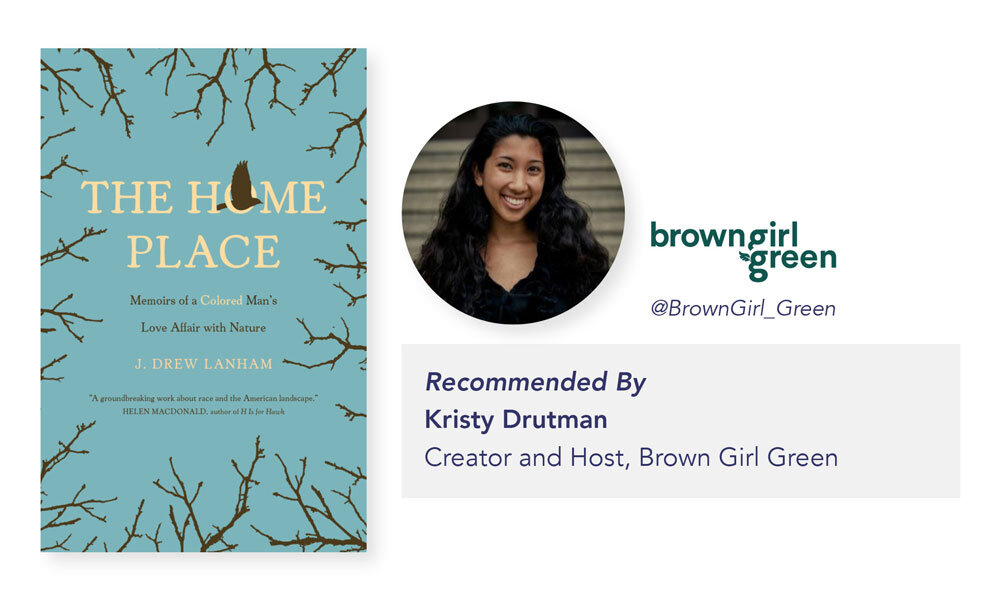
11) Small Is Beautiful: A Study of Economics As If People Mattered by E. F. Schumacher
“This book has been around for a long time (1973) and is considered a classic, but it has aged remarkably well. It is the book that really got me thinking about sustainability and the systemic challenges we face in trying to achieve it. For the TL;DRs who can’t manage an entire book, the chapter on Buddhist Economics is also available as a separate essay and easy to find online.” – Luke Disney, Co-CEO, Just-BI, @LukeDisney
Both timely and ahead of its time at release, E. F. Schumacher’s essay collection combines economics, philosophy and prescient scepticism to warn of the dangers that come with a “bigger is better” global economy. Since its republishing in 1999, the message of Small is Beautiful only resonates more strongly with those aware of the footprint each individual and company creates with its existence.
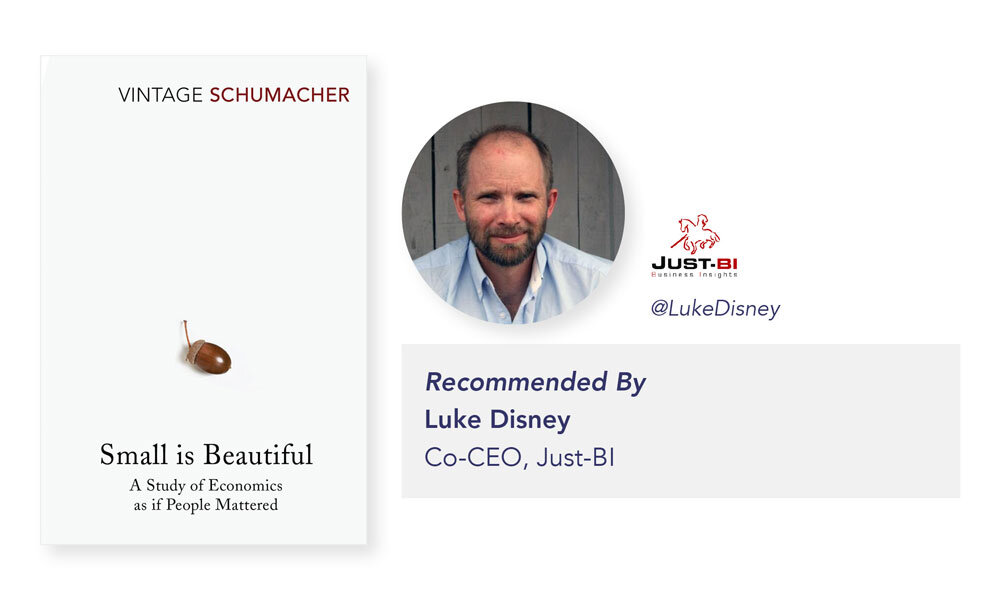
12) Demain, The Book by Cyril Dion
“The book Demain actually follows a documentary which explores what the world of tomorrow might look like by looking at potential solutions to the ecological breakdown and inequality crisis we are facing as a society. Through themes such as energy, education, economics or food, the book uses real life examples of initiatives to make us imagine how we could scale them up and address not only climate change and more important its root causes! I recommend it not only to activists or changemakers who want to be inspired, but to those who feel overwhelmed by the current state of the world and need a tangible proof that human collaboration can lead to great results! It is a book about hope, creativity and action that I think we should all read and keep close to us! / Le livre Demain résume le documentaire qui porte le même nom. Demain, c’est une vision de ce à quoi le monde de demain pourrait ressembler si on reproduisait partout dans le monde certaines initiatives locales qui cherchent à résoudre la crise écologique et climatique. Le livre se base sur des thèmes tels que l’éducation, l’énergie, l’économie ou l’agriculture et utilise des examples concrets d’individus ou de groups qui ont trouvés des solutions novatrices, ce qui produit un livre rempli d’espoir et de bonnes idées! La créativité humain est mise à l’honneur et inspirera non seulement ceux déjà bien engagés, ou ceux qui s’y initient doucement.” – Aliénor Rougeot, Head Organizer, Fridays for Future, @AlienorR2
Co-directed by author Cyril Dion and actress Mélanie Laurent, the documentary film Demain is available for streaming on Amazon Prime Video, Vudu and Microsoft store.
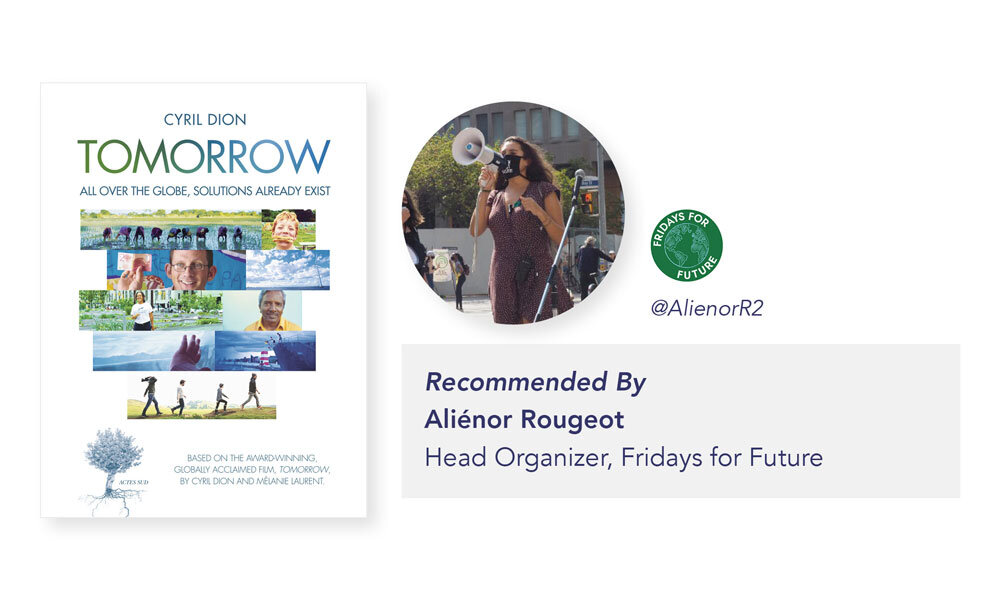
13) Winners Take All: The Elite Charade of Changing the World by Anand Giridharadas
“Before you go to work today to try making the world a better place, pick up a copy of Winners Take All by Anand Giridharadas. Anand illuminates the insidious, deeply destructive impact of bourgeoisie benevolence. He wields his insider perspective on so called “MarketWorld” with such candor I had to reconsider my own.” – Jordan Kasarjian, Associate, Inerjys, @JordanKasarjia1
Leveraging his high-level access and sober writing style, ex-New York Times columnist Anand Giridharadas delivers a no-holds-barred critique of the notion that climate salvation will be delivered from the private sector. Casting notable corporate change advocates as both willing arsonists and half-hearted firefighters of global problems, Giridharadas’ bestseller pulls few punches but starts many conversations.
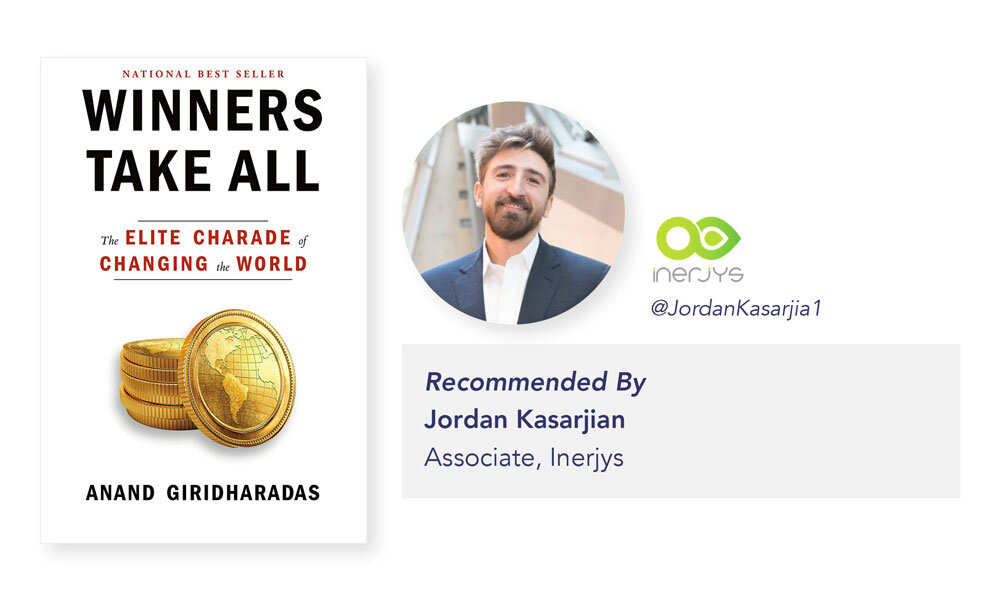
14) Taking a Break from Saving the World: A Conservation Activist’s Journey from Burnout to Balance by Stephen Legault
“Working on sustainability issues such as solving the climate crisis can feel like a daunting, never-ending marathon. This short read proposes practical techniques to maintain the mental health essential to stay an effective changemaker in the long-term. A timely read for those facing difficulties now as well as those interested in proactively building their personal resilience.” – Vincent Morales, Analyst, Pembina Institute, @Vin_Morales
A self-help guide for those who want to help others, Taking a Break from Saving the World offers advice and frameworks for combatting the draining effects of eco-anxiety and burnout. As more individuals and organizations commit themselves to social impact, more consideration must be given to the labour required to effect positive change, and how caring for the planet also requires caring for yourself.
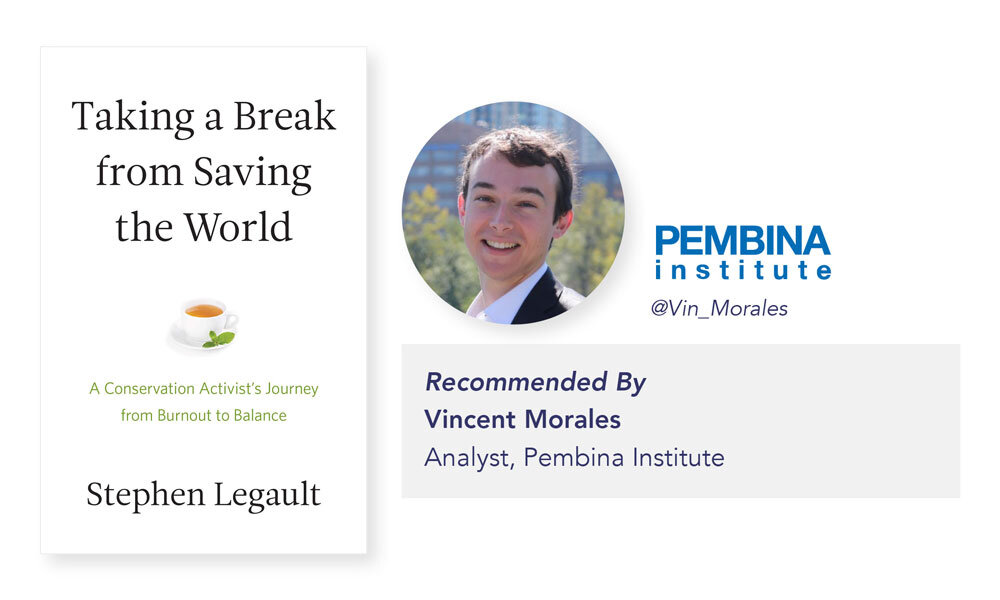
15) Drawdown: The Most Comprehensive Plan Ever Proposed to Reverse Global Warming by Paul Hawken
“We’re always trying to find solutions, but often get stuck in a loop rehashing the problems. Drawdown is an excellent introduction to applying the concepts of Regenerative Development to combat global warming. It starts from the premise that global warming/climate change is a) real, and b) we know what the problems are, so c) we should focus on solutions that are readily available and can be measured. The book ranks 100 viable ways to avoid/remove gigatons of CO₂ by 2050. It showed clearly that it’s not just technical fixes, more technology, or improved gadgets that will win the day: when put together, solutions 6 and 7 – universal education for girls and access to family planning for women – outperform the number 1 solution (refrigerant management).” – Shawna Henderson, CEO, Blue House Energy, @shawnahenders19
The ideal read for those who like organized, actionable information on combatting climate change, Drawdown’s synthesis of deep research and understandable language allowed it to quickly make the New York Times bestseller list following its release in 2017.
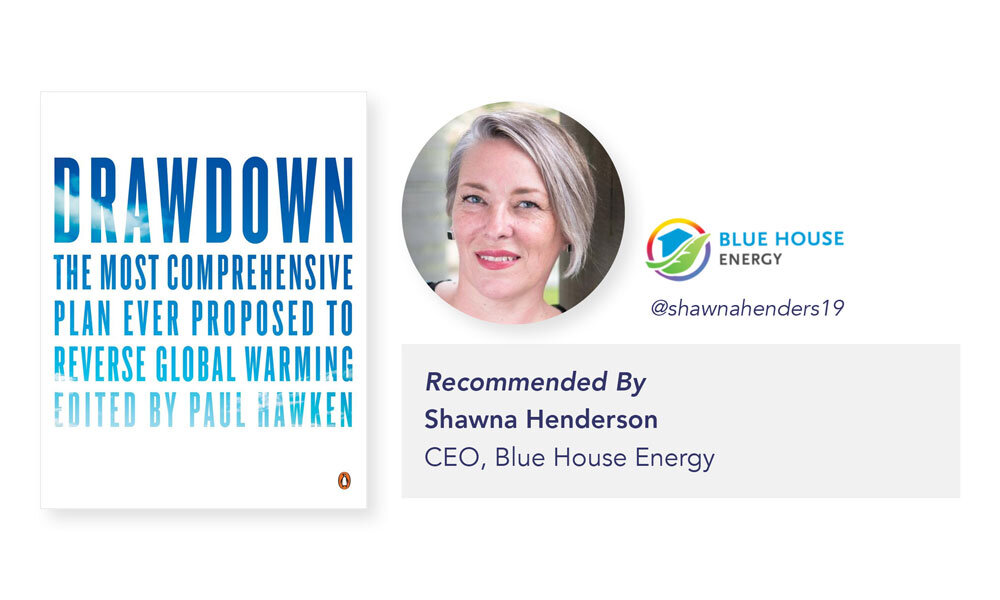
BONUS: The Clean Energy Review and Green Daily Newsletters
Looking for an additional dose of the latest on sustainability? One of our contributors wanted to give a shout out to two e-newsletters that keep you up-to-date on newsworthy sustainability stories, daily and weekly.
“Clean Energy Canada’s weekly newsletter, started by Dan Woynillowicz a few years back and now curated by Sarah Petrevan, is an always useful barometer of good news about steps forward, emerging data (jobs, investment, etc.) and climate science. Released Monday mornings, I’ve been told it’s the single most-read newsletter on the issues by Ottawa’s policy folks.
Bloomberg’s Green (usually) Daily email highlights climate-related activity in numerous spheres; today’s issue referenced the impact of Joe Biden’s climate plan on gas (it kills it), the growing problems of space junk from dead satellites (and its possible parallels to plastic waste in our oceans) and a report from PWC that 65% of all funds will have an ESG component by 2025.” – Gavin Pitchford, CEO and Founder, Delta Management, @GavinPitchford
